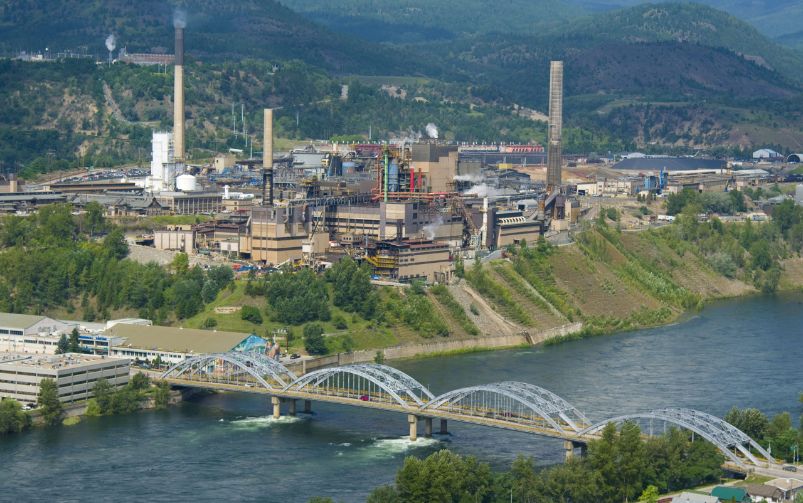On July 22, two ground collapses at Newmont’s Red Chris Mine in B.C. trapped three employees of a drilling company in a refuge station. They were successfully rescued on Thursday following efforts by an emergency response team. Courtesy of Newmont.
Welcome back to your weekly mining news recap, where we catch you up on some of the news you may have missed. This week’s headlines include Teck greenlighting the Highland Valley Copper mine life extension, Alcoa freezing its Canadian growth projects amid tariffs, and Champion Iron’s Kamistiatusset (Kami) iron ore project in Newfoundland and Labrador securing a $245 million investment.
Phase 1 of BHP’s Jansen potash project in Saskatchewan will cost up to 30 per cent more than initial estimates and be delayed by almost a year, with first production now expected in mid-2027. Delays stem from cost escalation, design changes and lower productivity. BHP said it may also postpone first production from Jansen’s Phase 2 by two years, to 2031. Construction of Phase 1 is 68 per cent complete, and Phase 2 is 11 per cent complete.
Three drillers who were trapped underground for more than 60 hours at Newmont’s Red Chris copper-gold mine in British Columbia after two fall of ground incidents have been rescued, The Canadian Press reported. Newmont confirmed the workers are safe and being supported by medical and wellness teams. The rescue operation involved drones and a remote-controlled scoop to remove a massive rockfall, estimated to span 20 to 30 metres in length and stand about seven to eight metres high.
Prime Minister Mark Carney said the new major federal projects office and Indigenous advisory council will be established by early September, with the aim of speeding up project approvals across Canada, Mining Weekly reported. Carney made the announcement at a three-day gathering of provincial and territorial premiers. At the same event, Ontario, Alberta and Saskatchewan signed a memorandum of understanding pledging to cooperate on building pipelines, railways and energy and trade infrastructure using Ontario steel, which will be essential for transporting the country’s critical minerals and oil and gas to new markets.
Teck Resources’s board of directors gave the final go-ahead for an expansion project that will extend the life of the company’s Highland Valley Copper mine in B.C. by 18 years, out to 2046, Bloomberg reported. This decision follows environmental approval for the expansion, which was issued last month. The project is central to Teck’s plan to double copper output by decade’s end, with expected average annual copper production of 132,000 tonnes. Teck also announced its second-quarter results, highlighting total copper production of 109,100 tonnes for the period.
Alcoa has paused all growth projects in Canada due to aluminum tariffs from the United States, Bloomberg reported. Alcoa CEO Bill Oplinger warned the company may seek Canadian government support if levies persist, with a decision expected by Aug. 1. In an interview with The Globe and Mail on Tuesday, Oplinger suggested that the U.S. may exempt Canada from tariffs will maintaining them on other countries. The Quebec operations, key to U.S. aluminum supply, face profitability challenges, and Alcoa is rerouting shipments usually intended for the U.S. to other countries. The firm paid US$115 million in tariff-related costs in the second quarter.
Australia’s Champion Iron is entering into a partnership with Japan’s Nippon Steel and Sojitz, which will invest $245 million for a 49 per cent stake in Champion’s Kami iron ore project in Newfoundland and Labrador, Reuters reported. Champion acquired the Kami project, which is close to its Bloom Lake operations in Quebec, in 2021 and will retain a 51 per cent stake. The deal follows a December 2024 agreement, with closing expected in late 2025.
Taseko Mines’ Florence Copper project in Arizona is over 90 per cent complete and on track to produce first copper cathode by late this year, Mining.com reported. The mine, which will use in-situ copper recovery, is expected to boost Taseko’s copper output by 120 per cent. Over 900,000 safe work hours have been logged, and key infrastructure, including wells and a substation, is complete.
Osisko Development has secured a US$450 million senior loan from Appian Capital to advance its Cariboo gold project in British Columbia, Canadian Mining Journal reported. The two-tranche facility will support pre-construction, drilling, loan repayment and working capital. An initial US$100 million was drawn.
Canagold Resources's feasibility study for its New Polaris gold project in B.C. is projecting production of over 800,000 ounces of gold over a mine life of 8.3 years, Mining.com reported. The company reported an estimated capital expenditure of $250 million, with all-in sustaining cost over the mine’s life at US$1,247 per payable ounce of gold. Under a base case gold price of US$2,500 per ounce, the project’s after-tax net present value at a five per cent discount is $425 million.
Ontario’s Workplace Safety and Insurance Board is investing $6.78 million to improve health and safety in Ontario’s mining and forestry sectors. In the June/July issue of CIM Magazine, I, Ashley Fish-Robertson, reported on the initiative. It is a partnership with Workplace Safety North and the Institute for Work and Health, which will focus on enhancing hygiene monitoring, reducing exposure to invisible hazards.
That’s all for this week. If you’ve got feedback, you can always reach us at editor@cim.org. If you’ve got something to add, why not join the conversation on our Facebook, Twitter, LinkedIn or Instagram pages?




